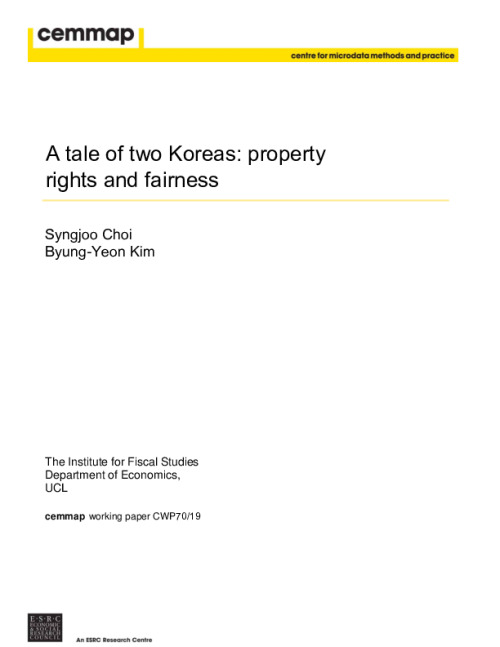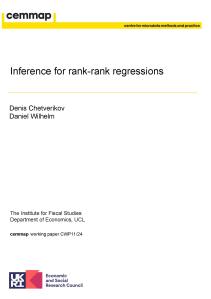Downloads

CW7019-A-tale-of-two-Koreas-property-rights-and-fairness.pdf
PDF | 908.12 KB
We compare two groups of the non-student Korean population—native-born South Koreans (SK) and North Korean refugees (NK)—with contrasting institutional and cultural backgrounds. In our experiment, the subjects play dictator games under three different treatments in which the income source varies: first, the income is randomly given to the subject; second, it is earned by the subject; third, it is individually earned by the subject and an anonymous partner and then pooled together. We find that preferences for giving depend on the income source in different ways for the SK and NK subjects. The SK subjects become more selfish when the income is individually earned than when it is gifted to them. Furthermore, the NK subjects are not responsive to the earned income treatment but behave more pro-socially when individually earned incomes are pooled. The NK subjects behave in a more self-interested manner when they participated in market activities in North Korea.
Authors

Research Fellow Columbia University
Sokbae is an IFS Research Fellow and a Professor at Columbia University, with an interest in Econometrics, Applied Microeconomics and Statistics.

University of Arkansas

Syngjoo Choi

Byung-Yeon Kim
Working Paper details
- DOI
- 10.1920/wp.cem.2019.7019
- Publisher
- The IFS
Suggested citation
Choi, S et al. (2019). A tale of two Koreas: property rights and fairness. London: The IFS. Available at: https://ifs.org.uk/publications/tale-two-koreas-property-rights-and-fairness (accessed: 30 June 2024).
More from IFS
Understand this issue

Gender norms, violence and adolescent girls’ trajectories: Evidence from India
24 October 2022

What are the challenges in getting debt on a falling path?
28 June 2024

Election Special: Your questions answered
27 June 2024
Policy analysis

IFS Deputy Director Carl Emmerson appointed to the UK Statistics Authority Methodological Assurance Review Panel
14 April 2023

ABC of SV: Limited Information Likelihood Inference in Stochastic Volatility Jump-Diffusion Models
We develop novel methods for estimation and filtering of continuous-time models with stochastic volatility and jumps using so-called Approximate Bayesian Compu- tation which build likelihoods based on limited information.
12 August 2014

Is there really an NHS productivity crisis?
17 November 2023
Academic research

Inference for rank-rank regressions
28 May 2024

Understanding Society: minimising selection biases in data collection using mobile apps
2 February 2024

The impact of labour demand shocks when occupational labour supplies are heterogeneous
28 June 2024